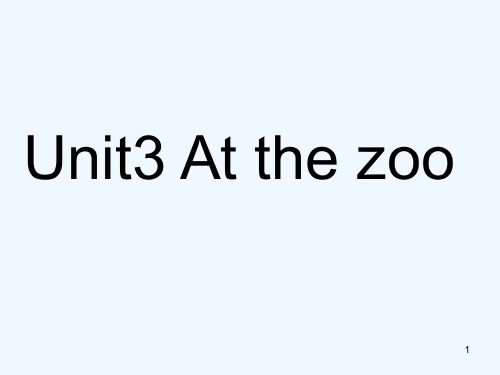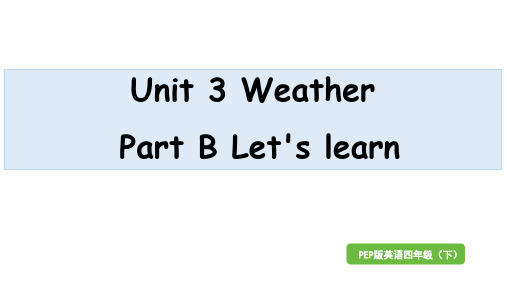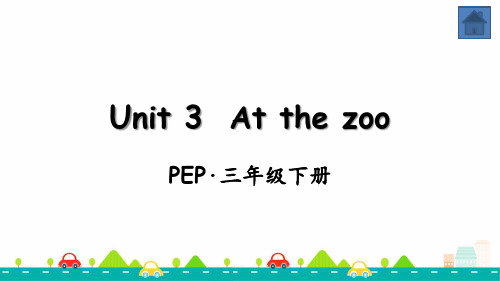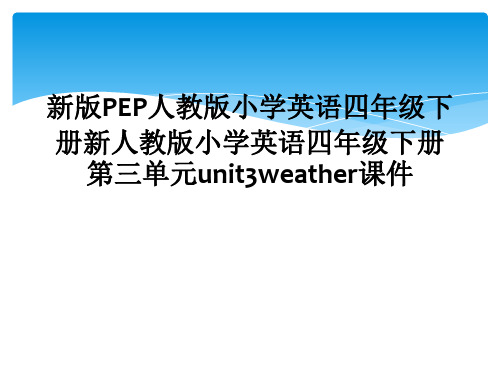下册Unit3课件
合集下载
PEP六年级英语下册Unit-3-PartA-Let’s-try课件精选全文

Mt.Tianshan
Turpan
Listen and answer
➢ Where did John go over his holiday? He went to Mt. Tianshan and Turpan in Xinjiang.
➢ What did he do there? He rode a horse and saw lots of grapes.
photos from the Labour Day holiday.
Listen, read and imitate
Amy: Where did you go? John: Mt. Tianshan, Xinjiang. I rode a horse.
Look, it’s very small! Amy: Oh, yes. It looks like a mule! Did you go
sorry I can’t come. Amy: OK. Bye.
What happened? I hurt my foot.
What happened? I had a cold.
John hurt his foot. He didn’t go to school. Did Amy go to John’s home? What happend to John?
1. Where is John now?
He is at the hospital.
2. Where is Amy now?
She is at school.
3. Why did Amy give a phone call to John?
Because John didn’t come to school.
人教版七年级英语下册Unit3 整体课件 78张

It’ll only take you a short time. 只花你一小会儿时间。
2) “by+交通工具”属固定介词短语,表 示“乘坐、使用某种交通工具”。如:
by bus 乘公交车 by train 坐火车 by bike 骑自行车 by air 坐飞机 by boat 乘船 请注意,英语中on foot表示“步行;走 路”,而不是by foot或on feet.
I take。。。。
He takes。。。。
moon
How long does it take you to school? It takes me 10 minutes to get to school by bus.
10 minutes 25 minutes 8 minutes
How long does it take you to school? It takes me 10 minutes to get to school by bus.
Unit 3 How do you get to school
Warming up Section A
Section B
selfcheck
take the train take the plane take the subway ride a bike
How do you get to Beijing? I ______to Beijing.
3) (指方式、方法)怎样,怎么 How did you climb to the top of that building? 你是如何爬上楼顶的? How do you get to school? 你是如何去学校的?
4) 用于惊叹句中,表示多么、何等。 How well you look! 你看起来多么健康啊! How I wish to have a long vacation these days! 这些天我多么希望去度一次长假啊!
2) “by+交通工具”属固定介词短语,表 示“乘坐、使用某种交通工具”。如:
by bus 乘公交车 by train 坐火车 by bike 骑自行车 by air 坐飞机 by boat 乘船 请注意,英语中on foot表示“步行;走 路”,而不是by foot或on feet.
I take。。。。
He takes。。。。
moon
How long does it take you to school? It takes me 10 minutes to get to school by bus.
10 minutes 25 minutes 8 minutes
How long does it take you to school? It takes me 10 minutes to get to school by bus.
Unit 3 How do you get to school
Warming up Section A
Section B
selfcheck
take the train take the plane take the subway ride a bike
How do you get to Beijing? I ______to Beijing.
3) (指方式、方法)怎样,怎么 How did you climb to the top of that building? 你是如何爬上楼顶的? How do you get to school? 你是如何去学校的?
4) 用于惊叹句中,表示多么、何等。 How well you look! 你看起来多么健康啊! How I wish to have a long vacation these days! 这些天我多么希望去度一次长假啊!
Unit3 复习课件人教版八年级英语下册

22.依赖
depend on
23.做家务
do chores
24.把某物借给某人 lend sb. sth.= lend sth. to sb.
25.讨厌做某事
hate to do/ doing sth
26.散步 27.照顾
take a walk care for=look after=take care of
8.在外面待到很晚 stay out late
9.搭车 10.从事
get a ride work on
11.帮助解决
help out with sth.
12.闲逛
hang out
13.至少
at least
14.扔下
throw down
15.过来
come over
16.频繁,反复 all the time
拓展:其他表示委婉请求的常用句型
Would you like (to do) sth.? May I do sth.?/ Shall we do sth.? Would you mind (doing) sth.? What/ How about (doing) sth.?
1. -__C_____ you please help me find my key? -No problem.
C.It's a shame
D.I&hink two hours of TV is enough for you! *two hours of: 在从句中做主语,谓语动词用单数形式。
*当时间、长度、距离或其他可数名词表示 一个完整概念做主语,谓语动词用单数
委婉地请求别人许可: Could I do sth.? 肯定答语:Yes, you can./Sure./I guess so./Certainly / Sure, that should be OK. /Of course. 否定答语: Sorry, you can’t./ I’m afraid you can’t. (并说明理由)
新版人教版英语五年级下册unit3_A_let‘s_learn精美课件 本

新版人教版英语五年级下册unit3_A_let‘s_learn精美课件 本
When is summer vacation ?
It’s in July and August .
When is Mid-Autumn Day?
It’s usually in September
or October.
新版人教版英语五年级下册unit3_A_let‘s_learn精美课件 本
Unit 3 My school calendar
B Let‘s learn,Ask and write
PREVIEW
There are _2_4__ hours in a day. There are __7__ days in a week. There are __4__ weeks in a month. There are __12__ months in a year.
月份
教学目标:
❖ 1.学会四会单词:July, August, September, October, November, December.
❖ 2.掌握句型:When is Mid-Autumn Day? It`s in September.
❖ 3.能完成Ask and write 部分任务,熟练地用英 语询问和回答常见节日所在的月份。 4.激发学生对了解中外节日的兴趣。
5.November_______ 6.December______
温馨提示:为更好地满足您的学习和使用需求,课件在下载后可以自由编辑,请您根据实际情况进行调整!Thank you for
完成Ask and Write
❖ 同学们别忘了in后面用月份,月份的第 一个字母要大写哦!
结语:
When is summer vacation ?
It’s in July and August .
When is Mid-Autumn Day?
It’s usually in September
or October.
新版人教版英语五年级下册unit3_A_let‘s_learn精美课件 本
Unit 3 My school calendar
B Let‘s learn,Ask and write
PREVIEW
There are _2_4__ hours in a day. There are __7__ days in a week. There are __4__ weeks in a month. There are __12__ months in a year.
月份
教学目标:
❖ 1.学会四会单词:July, August, September, October, November, December.
❖ 2.掌握句型:When is Mid-Autumn Day? It`s in September.
❖ 3.能完成Ask and write 部分任务,熟练地用英 语询问和回答常见节日所在的月份。 4.激发学生对了解中外节日的兴趣。
5.November_______ 6.December______
温馨提示:为更好地满足您的学习和使用需求,课件在下载后可以自由编辑,请您根据实际情况进行调整!Thank you for
完成Ask and Write
❖ 同学们别忘了in后面用月份,月份的第 一个字母要大写哦!
结语:
Unit 3At the zoo(全)(优质课)获奖课件 人教版三年级英语下册

课堂练习
(一) 1.读一读课本第24页Draw and say部分的对话。 2.画一画你喜欢的小动物,并用本课时的句型 向大家介绍一下。
(二) 看图,给下列动物选择相应的特征词,并向 大家介绍下列动物的特征。 A.fat B.tall C.short
1.﹙ ﹚
答案: 1.B It’s tall! 3.A It’s fat!
Let’s chant
The man is the father—tall,tall,tall! The woman is the mother—not so tall. That’s the son—small,small,small. They are a family,one and all!
句型操练
描述一个你喜欢的小动物的特征,让同 桌猜一猜是什么动物。
Unit 3 At the zoo
Part B 第二课时
Let’s learn
看图,用英文单词描述其相应的特征。
small 小的
big 大的
short 短的
long 长的
Wow!It has a small head! And a short tail. 哇!它有小脑袋! 还有短尾巴。
Let’s learn
sister 姐;妹 brother 兄;弟 mother 母亲;妈妈 father 父亲;爸爸 grandmother/ grandma (外)祖母 grandfather/ grandpa (外)祖父 Hi,I’m Mike.This is my family.Look!This is my grandmother.This is my...嗨,我是迈克。 这是我的家人。看!这是我的奶奶。这 是……
人教版三年级下册英语·Unit3 PPT

• I have a long nose and big ears. B.It has a long nose and big ears.
• B( )4.老师带领同学们做游戏,下口令:让你
自己变高,应说:
A. Make yourself long. B.Make yourself tall.
53
情景选择
(B)1.小白兔自我介绍:我有红红的眼睛,长长
50
翻译
(C)4. 哇!它有一个小脑袋。 A.Wow! It has a big head. B.Wow!It has a small nose. C.Wow!It has a small head. (B)5.大象又大又肥。 A.The pig is big and fat. B.The elephant is big and fat. C.The elephant is tall and thin.
catlook大家有疑问的可以询问和交流大家有疑问的可以询问和交流可以互相讨论下但要小声点可以互相讨论下但要小声点10选汉语意思3frienda
Unit3 At the zoo
1
animals
2
Don’t feed the animals!
禁止给动物喂食!
3
deer short
4
giraffe
(B)说1:.森林选美大赛上,动物们都各说所长,长颈鹿应
A. I have small eyes! B.I have a long neck.
(A)2.小松鼠骄傲地对小白兔说:“我有长长的大尾
巴!”,小白兔应说: A. I have red eyes. B.I have a long tail,too.
They are_b_ig_. 42
• B( )4.老师带领同学们做游戏,下口令:让你
自己变高,应说:
A. Make yourself long. B.Make yourself tall.
53
情景选择
(B)1.小白兔自我介绍:我有红红的眼睛,长长
50
翻译
(C)4. 哇!它有一个小脑袋。 A.Wow! It has a big head. B.Wow!It has a small nose. C.Wow!It has a small head. (B)5.大象又大又肥。 A.The pig is big and fat. B.The elephant is big and fat. C.The elephant is tall and thin.
catlook大家有疑问的可以询问和交流大家有疑问的可以询问和交流可以互相讨论下但要小声点可以互相讨论下但要小声点10选汉语意思3frienda
Unit3 At the zoo
1
animals
2
Don’t feed the animals!
禁止给动物喂食!
3
deer short
4
giraffe
(B)说1:.森林选美大赛上,动物们都各说所长,长颈鹿应
A. I have small eyes! B.I have a long neck.
(A)2.小松鼠骄傲地对小白兔说:“我有长长的大尾
巴!”,小白兔应说: A. I have red eyes. B.I have a long tail,too.
They are_b_ig_. 42
冀教版英语三年级下册Unit 3 15 What's Your Favourite Food课件

我不喜欢蔬菜。
chicken 鸡肉
水果 fruit
fish 鱼
蔬菜 vegetables
Language points
1. I like chicken. 我喜欢鸡肉。 这是表达某人喜好的句子。 句子结构:某人+ like + 名词/代词/ 动词不定式/动词 的ing 形式 意思是“我喜欢……”。
我喜欢饺子。 饺子很好(吃)。
My favourite food is noodles.
我最喜欢的食物是面条。
Let’s play!
What’s your favourite food?
My favourite food is noodles. What’s
your favourite food?
拓展:同义句型 句型结构:Which+名词+do you like best?
答语:I like +名词+best.
例:你最喜欢哪个颜色? 我最喜欢绿色。 —Which colour do you like best? / What’s your favourite colour? —I like green best. / My favourte colour is green.
Unit 3 Food and meals
Lesson 15
冀教版·三年级下册
New words
鸡;鸡肉
蔬菜
水果
喜欢
I like chicken.
I like chicken. 我喜欢鸡肉。
I don’t like fish. 我不喜欢鱼肉。
I like fruit. 我喜欢水果。
I don’t like vegetables.
chicken 鸡肉
水果 fruit
fish 鱼
蔬菜 vegetables
Language points
1. I like chicken. 我喜欢鸡肉。 这是表达某人喜好的句子。 句子结构:某人+ like + 名词/代词/ 动词不定式/动词 的ing 形式 意思是“我喜欢……”。
我喜欢饺子。 饺子很好(吃)。
My favourite food is noodles.
我最喜欢的食物是面条。
Let’s play!
What’s your favourite food?
My favourite food is noodles. What’s
your favourite food?
拓展:同义句型 句型结构:Which+名词+do you like best?
答语:I like +名词+best.
例:你最喜欢哪个颜色? 我最喜欢绿色。 —Which colour do you like best? / What’s your favourite colour? —I like green best. / My favourte colour is green.
Unit 3 Food and meals
Lesson 15
冀教版·三年级下册
New words
鸡;鸡肉
蔬菜
水果
喜欢
I like chicken.
I like chicken. 我喜欢鸡肉。
I don’t like fish. 我不喜欢鱼肉。
I like fruit. 我喜欢水果。
I don’t like vegetables.
人教版五年级英语下册Unit 3 My school calendar PPT课件全套

抬起靠近上腭(但不要贴住),舌的两侧需贴
住上齿的两侧,形成一条狭长的通道。双唇 稍收圆并略突出。气流通过时形成摩擦音, 声带不振动。
讲解来自《点拨》
典例
根据单词选出相对应的图片。 ( A )(1)lunch
A
( B )(2) shorts
B
A
B
习题来自《点拨》
一、写出下列单词的缩写形式。 (1) January (2) February (3) March (4) April (5)June ________ Jan. ________ Feb. ________ Mar. ________ Apr. ________ Jun.
讲解来自《点拨》
May /meɪ/ n. 五月 例句:May 1st is May Day.五月一日是劳动节 。 考向 发音:字母组合ay在单词中发/eɪ/音。
短语:May Day 劳动节
形近词:way 路 say 说
整体记忆法:把字母组合“ay”作为一个整体,可以组
成的单词有May(五月),way(道路;方法),
讲解来自《点拨》
知识点 3 Easter /'iːstə(r)/ n.复活节 例句:Please tell me about Easter.
请告诉我关于复活节的情况。 考向
短语:Easter eggs 复活节彩蛋 the Easter party复活节聚会
讲解来自《点拨》
快快长大:Easter (复活节) 复活节是一个西方的重要节日, 通常在三月末或四月初的某个星期
习题来自《点拨》
二、连一连月份与节日。
(1) January
(2) June (3) March (4) April (5) May
Unit3Reading课件牛津译林版九年级英语下册

合作探究
③Why did Mr Jiang decide to return the robot to the robot shop? Because the robot can also be too much trouble./ Because the robot brings too much trouble to Mr Jiang.
合作探究
2.阅读短文第一段,填表。
Who ① Mr Jiang
Job What Why
② A manager ③ Ordered a robot from a robot shop
Wanted to④ have more free time/have time to relax
合作探究
3.阅读短文2~4段,填空。
合作探究
阅读训练 ·导学建议·
1.引导学生画出每段的关键词,为复述短文提供帮助。 2.准备机器人发展历程的视频,以供学生观看。 ◎学法指导:给文章分段,并尝试写出每段的大意,理清文章思 路,从而更好地理解作者的意图。
合作探究
1.听短文录音,回答问题。 ①What is the passage about? Mr Jiang and his robot. ②Did the robot help a lot with Mr Jiang’s life in the beginning? Yes, it did.
合作探究
用所给单词的适当形式填空。 1.The passengers are not allowed to smoke (smoke) on the
train. 2.The passengers don’t allow smoking (smoke) on the
人教PEP版英语四年级下册Unit 3 Weather Part B Let's learn课件

Let's play
Moscow Beijing
Toronto New York
Here’s the world weaStyhdenre.yToday it’s warm and windy in Beijing. It's cold and snowy in Moscow. In Sydney, it's hot and sunny. In Toronto, it's warm and cloudy. But it's cool and rainy in New York.
A:What’s the weather like in London?
B:It’s cold and windy.
A:Is it hot and sunny in New York?
B:Yes, it is.
Summary
1. 学习了下列单词:sunny, rainy, snowy, windy, cloudy, world, Sydney, London, Singapore, Mosco七w彩课堂
C. rain
Exercises
三、根据天气调查表,完成对话。
sunny windy cloudy cold hot cool
Sydney
√
√
London
√
√
New York
√
√
A: What’s the weather like in Sydney?
B:It’s cool
and cloudy .
No, it isn’t. It’s cloudy.
Look and learn
Hello, dad! Where are you now?
人教版三年级英语下册Unit 3 At the zoo全单元课件

状元成才路
Exercise 选出下列每组中画线部分读音不同的一项。
( C ) 1.A. big
( C ) 2.A. five ( B ) 3.A. big ( B ) 4.A. sister
B. six
B. rice B. white B. China
C. nine
C. fish C. pig C. thin
状元成才路 状元成才路 状元成才路 状元成才路
Let's do
Be fat. Be fat. Be fat, fat, fat!
变胖。变胖。变胖、胖、胖!
Be thin. Be thin. Be thin, thin, thin!
变瘦。变瘦。变瘦、瘦、瘦!
Be tall. Be tall. Be tall, tall, tall!
Unit 3 At the zoo
Part A Let’s learn & Let's do
PEP· 三年级下册
Lead-in
Let’s go to the zoo and see animals!
Guessing game: What are they?
1 2 3
4
状元成才路 状元成才路
5
状元成才路
状元成才路
bear Look at my ______!
fat It’s ______!
elephant Look at my _______! fat It’s ______!
状元成才路 状元成才路 状元成才路 状元成才路
Exercise
选词完成句子。 so tall! (she/so) 1. It's _____ my cat.(me/my) 2. Look at _____ That giraffe is tall.(That/At) 3. ______ It's tall.(It/It's) 4. ______ me 5. Look at _____.(me/my)
人教版七年级英语下册Unit 3 整单元课件(共102张PPT)

?
How do American students get to school?
How do American students get to school?
?
How do American students get to school?
for handicapped(残疾的) students
Girl: He takes the bus.
Boy: How do Paul and Yang Lan get to
school?
小贴士:
Girl: They walk. Look, there 注th意e模y仿a以re“how”
now.
开头的特殊疑问句 的语调。
Have a try !
Sally bike
What’s the
way of traveling?
Means of transportation in the future
More comfortable 更舒适 More convenient 更便捷 Better for the environment 更环保 Better use of the energy 更节能
Let’s travel: May Day is coming !
Survey(调查)
How do you get to your favorite place?
Names How do you get to… ? Reasons (why)
Mrs. Xu by train
comfortable(舒适的)
How does she get to school?
Does she …? Yes, she does./ No, she doesn’t.
How do American students get to school?
How do American students get to school?
?
How do American students get to school?
for handicapped(残疾的) students
Girl: He takes the bus.
Boy: How do Paul and Yang Lan get to
school?
小贴士:
Girl: They walk. Look, there 注th意e模y仿a以re“how”
now.
开头的特殊疑问句 的语调。
Have a try !
Sally bike
What’s the
way of traveling?
Means of transportation in the future
More comfortable 更舒适 More convenient 更便捷 Better for the environment 更环保 Better use of the energy 更节能
Let’s travel: May Day is coming !
Survey(调查)
How do you get to your favorite place?
Names How do you get to… ? Reasons (why)
Mrs. Xu by train
comfortable(舒适的)
How does she get to school?
Does she …? Yes, she does./ No, she doesn’t.
Unit3 Animals(课件)鲁科版(五四学制)(三起)英语三年级下册

• 1. Let ' s go to the zoo . • 让我们去动物园吧。 • .这是提建议的祈使句。 • let ' s 是 let us 的缩写形式,意为"让我们"。 • 【句型结构】 Let ' s +动词原形+其他.
give an example
• 例:- Let ' s play football . • 让我们踢足球吧。 • OK !好的! • - Let ' s go shopping . • 让我们去购物吧。 • - Great !太好了! • - Let ' s go to the park and see the flowers ! • 让我们去公园赏花吧! • - Yeah !好的!
• 4. They ' re lovely .它们很可爱。 • .这是对某人或某物的评价。 • 【句型结构】人称代词+ be 动词+形容词. • 【重点解析】 lovely 是形容词,意为"可爱的"。 • 例: She is lovely .她很可爱。
Sentence pattern analysis
谢谢观看
•Thank you for watching.
• 【重点解析】
• .此句型用于介绍这些/ 那些事物,事物名称要用 可数名词复数形式。
• . these 为指示代词,通常 指空间上离说话人较近的 事物,意为"这些"。
• . those 为指示代词,通常 指空间上离说话人较远的 事物,意为"那些"
Sentence pattern analysis
短语
• go to the zoo 去动物园 • how many 多少
give an example
• 例:- Let ' s play football . • 让我们踢足球吧。 • OK !好的! • - Let ' s go shopping . • 让我们去购物吧。 • - Great !太好了! • - Let ' s go to the park and see the flowers ! • 让我们去公园赏花吧! • - Yeah !好的!
• 4. They ' re lovely .它们很可爱。 • .这是对某人或某物的评价。 • 【句型结构】人称代词+ be 动词+形容词. • 【重点解析】 lovely 是形容词,意为"可爱的"。 • 例: She is lovely .她很可爱。
Sentence pattern analysis
谢谢观看
•Thank you for watching.
• 【重点解析】
• .此句型用于介绍这些/ 那些事物,事物名称要用 可数名词复数形式。
• . these 为指示代词,通常 指空间上离说话人较近的 事物,意为"这些"。
• . those 为指示代词,通常 指空间上离说话人较远的 事物,意为"那些"
Sentence pattern analysis
短语
• go to the zoo 去动物园 • how many 多少
新版PEP人教版小学英语四年级下册新人教版小学英语四年级下册第三单元unit3weather课件

weather
world weather
世界天气
rainy snowy
Here’s the world
windy weather. Today it’s hot
and sunny in Sydney.
cloudy
sunny
What’s the weather like in Sydney?
It’s hot and sunny.
The fifth class
weather
rainy snowy cloudy windy sunny
What’s the weather like in Sydney?
悉尼天气怎么样?
It’s hot and sunny.
炎热的,多阳光的。
I can go outside.
我可以去外面。
/ɑ:/
park mark far farm hard
al 放在单词的中间
/ɔ:/ 长元音
ball
/ɔ:/
tall
/ɔ:/
wall
/ɔ:/
读一读
/ɔ:/
fall mall small hall
读一读
/ə/ water sister tiger dinner computer /ə:/ girl bird nurse hamburger /ɑ:/ arm car card /ɔ:/ ball tall wall
Moscow London Beijing Singapore Sydeny New York
莫斯科红场 狮身鱼尾像
rainy snowy
Here’s the world
windy weather. Today it’s hot
新人教版小学英语四年级下册第三单元-unit-3-weather-新课件

我可以去外面。
I can’t go outside.
我不可以去外面。
Can I go outside? 回答
我可以去外面吗?
Yes, you can.
是的,你可以。
No, you can’t.
不,你不可以。
Let’s talk 1
Mike: Mum, what time is it? Mom: It’s 11:00. Mike: Can I go outside now? 我现在可以去外面吗? Mom: No, you can’t. It’s cold outside. 外面很冷。 吃午饭 Have some lunch, Mike. Mike: OK. Can I have some soup? 我可以喝一些汤吗? Mom: Yes, you can.
Sydeny 30℃
Beijing 15℃ It’s hot and sunny.
New York 20℃ London 5℃
Toronto 7℃ What’s the weather like in Toronto?
Sydeny 30℃
Beijing 15℃ It’s cold and sunny.
Toronto 7℃ What’s the weather like in London?
Sydeny 30℃
Beijing 15℃ It’s cold and cloudy.
New York 20℃ London 5℃
Toronto 7℃ What’s the weather like in Sydney?
It’s cold in Harbin today
Good morning. This is the weather report. It’s Cold in Harbin today.
I can’t go outside.
我不可以去外面。
Can I go outside? 回答
我可以去外面吗?
Yes, you can.
是的,你可以。
No, you can’t.
不,你不可以。
Let’s talk 1
Mike: Mum, what time is it? Mom: It’s 11:00. Mike: Can I go outside now? 我现在可以去外面吗? Mom: No, you can’t. It’s cold outside. 外面很冷。 吃午饭 Have some lunch, Mike. Mike: OK. Can I have some soup? 我可以喝一些汤吗? Mom: Yes, you can.
Sydeny 30℃
Beijing 15℃ It’s hot and sunny.
New York 20℃ London 5℃
Toronto 7℃ What’s the weather like in Toronto?
Sydeny 30℃
Beijing 15℃ It’s cold and sunny.
Toronto 7℃ What’s the weather like in London?
Sydeny 30℃
Beijing 15℃ It’s cold and cloudy.
New York 20℃ London 5℃
Toronto 7℃ What’s the weather like in Sydney?
It’s cold in Harbin today
Good morning. This is the weather report. It’s Cold in Harbin today.
Unit3StoryTime(课件)人教新起点版英语三年级下册

小学英语
Activities of My Day
get up
have breakfast have online classes
At 7 o’clock, I’m going to… At
run study , I’m going to…
小学英语
Activities of My Day
At
, I’m going to… At
小学英语
listen and read.
1.How many students are there in the story?
2.Why is the boy so tired?
小学英语
Read again.
What is he going to do?
暂停播放5 分钟,读故 事。
小学英语
Read and answer.
小学英语
Unit 3 After SchoolActivities Story Time
小学英语
Jeeby
Jeeby is going to sisnign.g
Pod
Pod is going to ssleleeepp.
Tappy
Tappy is going to ddaannccee.
They are going to
小学英语
1. Who are they? 2.What are they wearing? 3.What are they going to do after school?
小学英语
What are you going to do?
I’m going to play ping-pong. I’m going to get my bat.
湘少版英语四年级下册Unit 3 What can you see课件

too…to…
太……而不能……
辨一辨
• The dress is ___m_u__ch__t_o_o___ big for me. 这条裙子对于我来说太大了。
• There is ___t_o_o_m__u_c_h___ water in the bottle. 瓶子里的水太多了。
• The girl is ___t_o_o___ young ___t_o___ go to school. 这个女孩年龄太小而不能上学。
I can see white clouds and the blue sky.
What can you see, Peter?
What can you see, Mingming?
I can see mountains.
I can see a cake!
Language points
1. What can you see? 你能看见什么? 这个由what引导的特殊疑问句,用于询问对方能看 见什么。 句型结构:What can+主语+动词原形+其他? 例句:在图片里你能看见什么?
mountain“高山;山岳”,其复数形式 mountains 常表示“山脉”,通常指比 hill 大或陡峭的高山。 例句:我喜欢爬山。
I like climbing mountains.
Let’s learn
the sun 太阳
the moon 月亮
star 星星
cloud 云
sea
boat
拓展:there be 句型与 have
① there be句型表示某处存在某人或某物,指客观存在, 不表示所属关系。 例句:我的房间里有一台空调。 There is an air-conditioner in my room. (空调不归房间所有)
